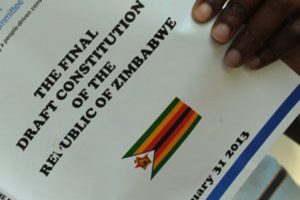
22 May 2020 marks the seventh year of the coming into force of the
Constitution, the highest law that was approved by the majority of
Zimbabweans who voted in the constitutional referendum held in March
2013.
For ZLHR, the seventh anniversary of the Constitution being in 2020 is
not just symbolic but an important opportunity to assess progress in
the implementation of the Constitution, take stock of the achievements
made, the lessons learnt and the challenges that lie ahead in
enhancing a critical foundation to incrementally nurture a democracy
in Zimbabwe.
The enactment of the Constitution was premised on facilitating a
constitutional journey from the shame of the country’s past to the
promise of the future which delivers on its democratic promise and
transformative aspirations.
Since its adoption in 2013, the Constitution has become a symbol of
the hopes and aspirations of Zimbabweans and some citizens have sought
to assert their fundamental rights and freedoms as enshrined in the
‘Declaration of Rights’ and held state and non-state actors to account
for their transgressions in fulfilling their constitutional
obligations.
While the coming into effect seven years ago of the Constitution
signalled the dawn of a new era and a break with the past, an
assessment by ZLHR over the past seven years shows that the “new”
Governance Charter is just a paper tiger as authorities remain
reluctant to fully implement it and continue to wilfully violate its
progressive provisions.
More concerning for ZLHR are the commonplace contraventions of the
Constitution by duty-bearers, with continuing impunity.
Although some laws have been amended or promulgated to align or comply
with the Constitution, a number of gaps still exist.
Of great concern to ZLHR is government’s increasing reliance on
governing through promulgation of subsidiary legislation contained in
a record Statutory Instruments promulgated during the era of the
so-called “new dispensation”.
ZLHR is disconcerted that the Constitution is already being amended
for the second time with the gazetting of Constitutional Amendment
(No.2) Bill 2019, that seeks to consolidate the power of the President
and erode the power of the legislature to effectively exercise checks
and balances on the Executive in certain matters and also has negative
implications on the independence of the judiciary and the
Prosecutor-General amongst other issues.
This rapid amendment of 27 sections of the Constitution is not
reasonably justifiable and undermines the national objectives set out
in Chapter 2 of the Constitution.
It is worrying and shocking that law enforcement authorities continue
to misinterpret and selectively misapply laws to suppress people’s
fundamental freedoms and rights while citizens are brutalised,
abducted, disappeared and tortured in violation of their right to
personal security, the right to human dignity and freedom from torture
or cruel, inhuman or degrading treatment or punishment.
Local authorities and central government continue to contravene
fundamental protections of freedoms and rights to property, freedom of
profession, trade and occupation, provision of health care services,
potable water, and freedom from arbitrary eviction.
ZLHR holds the President of Zimbabwe, including the Ministry of
Justice, Legal and Parliamentary Affairs and other line ministries
accountable for failing in executing their primary responsibility of
ensuring that the Constitution is respected, protected and fully
enforced. These primary duty-bearers must act in a manner that
respects, protects, and upholds the principles and values for which
people voted.
ZLHR wishes to remind the Executive, of the voluntary commitments the
twenty-six (26) member delegation made on behalf of the Government of
Zimbabwe in November 2016, during the United Nations Human Rights
Council Universal Periodic Review during the session that was held in
Geneva, Switzerland. The ‘26-member government delegation’ was led by
the incumbent President, His Excellency Emmerson Dambudzo Mnangagwa,
in his capacity as the Minister of Justice, Legal and Parliamentary
Affairs at that time.
As provided in the Working Group Report during the 34th Session, it is
reported that the Zimbabwe delegation accepted most (noting a few)
recommendations on the Constitution from the following countries;
Australia, Czechia, Egypt, France, German, Ghana, Iran, Ireland,
Italy, Kenya, Netherlands, New Zealand, Republic of Congo, Republic of
Korea, South Africa, Spain, Sweden, Switzerland, Thailand, Togo,
Uganda and United Kingdom. These United Nations (UN) member states
encouraged Zimbabwe to align laws with Constitution, fully implement
and comply with the Constitution.
On its part, over the years, Zimbabwe has also proposed 190
recommendations to other UN member states that have come under review
during the Universal Periodic Review Mechanism. This process is a peer
to peer review by countries on state of compliance with UN human
rights obligations.
On its part, ZLHR will keep demanding enforcement and accountability
for the actions or non-actions of those with obligations to ensure
government’s adherence to the principles of constitutionalism, respect
for the rule of law and human rights treaty obligations. Honest and
firm compliance, respect for constitutionalism and political will is
required if people are to be empowered to assert their constitutional
rights and freedoms.
Therefore, ZLHR calls on the government to;
• Take urgent action to align the country’s laws with the Constitution
and to make the vision a reality.
• Urgently implement outstanding legislative reforms and harmonise
laws to the Constitution.
• Ensure that the attitudes, conduct and behaviour of all state
officials and agencies conform to the standards set out in the
Constitution and that non-state actors are also held to account where
they fail to respect and uphold the Constitution.
• Foster a culture of constitutionalism through respect for the
supremacy of the Constitution.
• Ensure that all security services members comply with the provisions
of section 208 of the Constitution which prescribes their conduct and
foster harmony and understanding between them and civilians.

